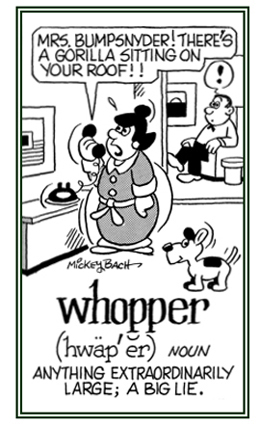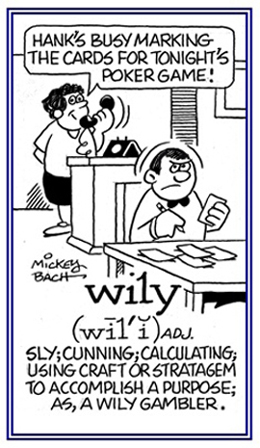English Words in Action, Group W
(a variety of English words which have developed through history and are currently used in our modern age)
Simply click on this banner (or the following link) and you will be on your way to stimulate your brain for greater word comprehension with quizzes based on some of the words in this unit.
Bruce's mother was weeping with joy when she heard that he had won the marathon race.
Maude wept with happiness when her son, who had been traveling, arrived home safely.
2. A gross or blatant lie: Harry's neighbor, told his wife a whopper about how well he played and defeated his opponents during a golf competition even though he was a loser.
3. Etymology: "an uncommonly large thing," originally an audacious lie, was formed as if from whop, "to beat, to overcome." Whopping, "large, big, impressive" is attested by 1620s and is of uncertain origin.

Go to this Word A Day Revisited Index
so you can see more of Mickey Bach's cartoons.
A widget is also known as a small useful device in cell phones that allow users to take pictures or videos, listen to music, etc. in addition to talking to people.
2. Referring to being done haphazardly, without planning or direction: Too many politicians are expanding their willy-nilly spending programs.
A willy-nilly unplanned decision was made to change the financial rules for paying bonuses.
3. Etymology: a modified form of an older phrase that is variously expressed as will I, nill I or will ye, nill ye. Will is used in its sense of "wanting to do something, to wish or to desire that something should happen"; while nill is an old and outdated term for "to want not to do something, to refuse or reject some course of action" or they are combined to mean, "I am willing, I am unwilling".The most recent meaning is "starting a project without a reason or planning" or something that is done in a "disorganized way".
A Latin equivalent is nolens volens, “unwilling, willing”.
The willy-nilly speech by the politician resulted in a loss of support by many voters.
2. A haphazard or disorganized description of a situation: The city officials passed another willy-nilly law that would increase local taxes.The two students were told by the housing manager to clean up the willy-nilly condition of their dorm room of scattered books, unmade beds, piles of clothing, etc. or they would have to find another place to live.
2. Descriptive of someone who is skilled at gaining an advantage over others; especially, in a deceitful way: Shirley was told that the jewelry salesman was a wily person and not to be trusted; which was a good thing that she was warned because he was planning to sell her a fake diamond necklace.
3. Etymology: from Old English, wil, "stratagem, trick, sly action."


Go to this Word A Day Revisited Index
so you can see more of Mickey Bach's cartoons.
2. Charming, often in a childlike or naive way; that is, having or showing an excessively simple and trusting view of the world and human nature, often as a result of being very young and inexperienced: The students joined in a winsome pose for the photographer at their summer picnic.
3. Etymology: winsome people easily "win" friends, so it should not be surprising that "winsome" and "win" have a common root.
2. A beauty and pleasantness that people like to see: The winsomeness of the new singer pleased the audience very much.
2. Full of wishful yearning; pensively sad; melancholy: The wistful music filled Mike with sadness.
3. Etymology: the meaning of "longing, yearning" existed in 1613-1616; formed from obsolete English wist(ly), "intently"; which was of uncertain origin before 1500.
The meaning of "expectantly" or "yearningly eager, longing" was first recorded in 1714.
Mark Twain was a famous wit because he had the natural ability to create humor with a sharp tongue and quick responses.
2. A person who has mental sharpness and inventiveness: Polly was a wit with keen intelligence when she used words and ideas in quick and inventive ways.2. To lose the freshness of youth, as from age: At the age of 30, Sam's youth had withered away.
3. To make flaccid, shrunken, or dry, as from loss of moisture; cause to lose freshness, bloom, vigor, etc.: Sharon is ashamed to admit that the lettuce withered in her refrigerator because she forgot to use it in time.
4. To abash, as with a scathing glance: Shana gave Josh a look that withered him.
5. Etymology: an alteration of Middle English wydderen, "dry up, shrivel" (c.1300), apparently a differentiated and special use of wederen, "to expose to weather".
There is an indication of a possible relationship with the German verwittern, "to become weather-beaten"; from Witter, "weather".
Links to all of the groups of English words in action, Groups A to Z.
You may see the bibliographic list of sources of information for these words in action.


